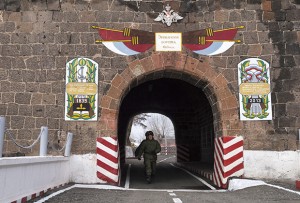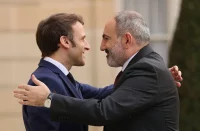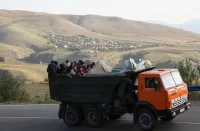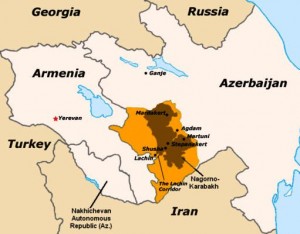The formerly frozen conflict of Nagorno-Karabakh is showing rapid signs of thawing, unleashing the prospect of a renewed war between Armenia and Azerbaijan. Last week, a total of 15 soldiers were killed from both sides in what was the worst ceasefire violation in the 20 years since it was first agreed to. Unlike the first Nagorno-Karabakh War, however, a continuation conflict will likely see all the regional countries being dragged into it, even setting the stage for a disastrous domino destabilization that could place Russia and NATO a hair-trigger away from war.
The objective of this work is not to explain the roots of the crisis but to forecast its developments. Its genesis is very complex and controversial, in some ways representing a regional version of the Israel-Palestine issue. It is thus recommended that the reader refer to both the Armenian and Azeri Foreign Ministry sites for their respective interpretation of the conflict and draw their own conclusions. Additionally, for a strategic background from the perspective of American foreign policy goals, please review “The Reverse Brzezinski” and “The American Aggression Enabling Act”.
Part I: Actor Overview
To briefly place everything into context, it is necessary to have a general understanding of the long-term course that each actor has charted. ‘Placing the pieces on the board’ will set the stage for the second part, which delves into the forecasted conflict scenario and the probable interaction between players if a continuation war unfolds.
Regional
(For a side-by-side comparison of each country’s military capabilities, please reference Yuri Simonyan’s article in New Eastern Outlook journal)
The country is an historic Russian ally that has been blockaded by Azerbaijan and Turkey for over two decades. Russia hosts a Soviet-inherited military base there and has a mutual defense commitment to Armenia through the CSTO. The two allies are also building an integrated air defense system. Due to their close ties, Armenia decided to integrate into the Russian-led Eurasian Union and reject the EU’s Association Agreement. Altogether, it has decisively thrown its weight behind Russia in all regards.
Azerbaijan:
This natural resource-rich state opened its deposits up to Western investment in the 1990s, eventually launching the geostrategic BTC oil pipeline and currently in talks to supply the symbolic TAP gas pipeline. Since independence, it has tried to move as close to the West as institutionally possible, all the while attempting to delicately balance its interests with neighboring Russia and Iran. It has lately attempted to cultivate a shared social identity with the EU, hosting the 2012 Eurovision contest and the future 2015 European Games. It flirts with the EU and NATO and it has very intimate ties with Israel. The US is mulling whether or not to give it enhanced US and NATO security assistance, but regardless, it is very militarily close with its historic cousin and NATO member Turkey. Although officially neutral and ever pivoting between the West and the non-West (Russia, Iran), it is strongly moving towards siding with the former.
Georgia:
The Dream Coalition currently governing the country is a political illusion. Although working to prosecute former president Saakashvili and his cronies, they are doing nothing to reverse the political direction he set the country on. Georgia signed the EU Association Agreement in late June and still wants to join NATO. Washington has taken note of this and may declare Georgia a major non-NATO ally if the “Russian Aggression Prevention Act of 2014” passes. The country has a sizable Armenian minority inhabiting the southern border area, with the group constituting the majority in Samtskhe-Javakheti region. Due to the joint Azeri-Turkish blockade and poor transport infrastructure into Iran, Armenia is dependent on Georgia for imports and exports. Of the three examined Caucasian states, Georgia is the most pro-Western.
Neighboring
Iran:
This aspiring Mideast hegemon is trying to remove its negative stereotype in the Western political psyche and rebrand itself as a peaceful and responsible regional actor. It is endeavouring to emerge from punitive Western sanctions and establish constructive relations with the West, but on an equal and respectful footing. Russia has been a close ally in helping Iran acquire nuclear energy technology and anti-aircraft defences (with the inference that they would deter an Israeli and/or American bombing), and the two countries’ regional interests coincide in supporting the Syrian government and opposing the spread of terrorism. Iran has nurtured extremely positive relations with Armenia since 1991 but has mixed ties with Azerbaijan. At least a quarter of the population are of Azeri descent, and Baku has been coy about supporting separatist ambitions there despite most of this community patriotically identifying as Iranian. The unresolved delineation of the energy-rich Caspian border almost led both countries to war in 2001 and still remains a hot issue to this day. Iran is also suspicious of Azerbaijan’s booming ties with Israel, believing that Baku is being used as a proxy and possible drone base against it. Nonetheless, Iran does hold one trump card in bilateral relations – it supplies Azerbaijan’s vulnerable enclave of Nakhchivan with gas. In order of best to worst, Iran is on great terms with Russia and Armenia, less so with Azerbaijan and the US, and has no official relations with Israel. Ties with Turkey are currently lukewarm and practical.

Russia:
Moscow is the historic hegemon for South Caucasus affairs and helped to reach the 1994 Nagorno-Karabakh ceasefire. It sells weapons to both Armenia and Azerbaijan and has an interest in maintaining a peaceful equilibrium between both rivals and preventing out-of-regional actors from securing a dominant foothold here. Russia achieved a significant victory against Georgia in 2008 and demonstrated its resolve to defend its regional allies (South Ossetia and Abkhazia) from aggression against their territory. Over the past few years, relations have declined with the West, most noticeably and precipitously after the February coup in Ukraine. Concurrent to this, Russia has aspired to create the Eurasian Union, which was finally consecrated in late May, placing it in direct competition with the EU’s plans for the Caucasus. Russia is also against the expansion of NATO, both in official and shadow form.
Turkey:
This regional heavyweight is an important NATO member and harbors ambitions of Neo-Ottomanism (regional neo-colonialism). It has accordingly played a huge role in the US and NATO’s destabilization of Syria and is eager to flex its muscles on behalf of its military patrons. Being so close to its Azeri kin, the two states endearingly refer to their relationship as being of “one nation, two states”.As a result, Turkey has pledged solidarity with Baku since the beginning of the Nagorno-Karabakh conflict and reaffirmed its support for the country and its armed forces last week. It is dually responsible with Russia (as the successor state to the USSR) for preserving the security and integrity of the Azeri enclave of Nakhchivan per the 1921 Treaty of Kars, and Foreign Minister Davutoglu reminded the world of this in 2010. Turkey enjoys friendly and pragmatic relations with Russia, but the two could very well butt heads by militarily supporting opposite sides in the Nagorno-Karabakh conflict.
Non-Neighboring
EU:
The heterogeneous hodgepodge that is the EU has been seeking to expand into the former Soviet Union using the Eastern Partnership platform. In late 2013, Azerbaijan was the only one of the six partner states that did not ‘take a side’ between the EU and the Eurasian Union. Although it would later say that it does not want to sign an Association Agreement (possibly to placate Russian fears that it was moving too rapidly in the Western direction), the EU did not chastise it. This may be due to its long-term goal of trying to transform Azerbaijan into a non-Russian energy conduit. The EU’s cozy relationship with Azerbaijan may also be because it invested cultural capital in it through Eurovision and the upcoming European Games. This demonstrates a strong effort to convince the European population that Azerbaijan is ‘part of Europe’, and by inference, part of the EU’s expanding ‘civilizational’ institution and therefore ‘not Russian-affiliated’.
Israel:
Israel is a close but semi-covert ally of Azerbaijan, with mutual ties having been described by President Aliyev as being “nine tenths below the surface”, just like an iceberg. Besides their mutual antagonisms against Iran, they also have shared energy interests since Azerbaijan supplies 40% of Israel’s oil. The same source, The Jerusalem Post, also reports that bilateral trade is $3 billion and that Azerbaijan buys “hundreds of millions of dollars worth of arms” from Israel. Quite clearly, Israel and Azerbaijan are strategic allies and firmly support one another.
US:
America’s adaptation to the changing multipolar environment has been to utilize the Lead From Behind strategy to solicit regional allies to do its bidding. As with Georgia in South Ossetia and Abkhazia or Turkey in Syria, the US may very well tempt Azerbaijan with the forbidden Karabakh fruit to get it to do Washington’s bidding and go against its own rational interests. The US’ overall goal is to expand its military influence and NATO’s in order to contain and then rollback Russia, with the eventual long-term goal of dismantling it completely. Strategic destabilization of Russia’s periphery is the current stage of the game, and as it has shown in Ukraine, it has no qualms about creating Black Holes of Chaos to advance its overall unipolar objectives.















Pingback: Nagorno-Karabakh and the Domino Destabilization of Disaster (II) | Oriental Review
Pingback: The Coming EU-Eurasian Union Crisis In The Caucasus | Oriental Review
Pingback: The Male Nuland And The US’ Central Asian Strategy I | Oriental Review
Pingback: Washington stalks its next victim, sends color revolution expert “male Nuland” to Kyrgyzstan | Free Ukraine Now
Pingback: Azerbaijan should be very afraid of Victoria Nuland | Free Ukraine Now
Pingback: Washington’s Central Asian Strategy: “Color Revolution Expert” Dispatched to Kyrgyzstan | SHOAH
Pingback: The Colourful Guns: Trouble in the ‘stans | A House With No Child
Pingback: “The New Middle East” : Russian Style | Uprootedpalestinians's Blog
Pingback: “The New Middle East”: Russian Style Part I | SHOAH
Pingback: Hybrid Wars 1. The Law Of Hybrid Warfare | Oriental Review
Pingback: Today’s News March 14, 2016 | Fiat Planet
Pingback: Mega analysis: 2016 Trends Forecast by Andrew Korybko – GPOLIT
Pingback: Hybrid Wars 1. The Law Of Hybrid Warfare- by Andrew Korybko - GPOLIT
Pingback: Hybrid Wars 1. The Law Of Hybrid Warfare - Africa Horn Now
Pingback: “Guerras Híbridas” – Abordagem adaptativa pós-tudo da ‘mudança de regime’ – SENHOR X
Pingback: Armenia Abandoning Russia: Consequences for the Caucasus? - Regional Rapport
Pingback: Map Of Border Between Iran And Turkey – Kristamarie
Pingback: Guerres hybrides : 1. La loi de la guerre hybride | Arrêt sur Info